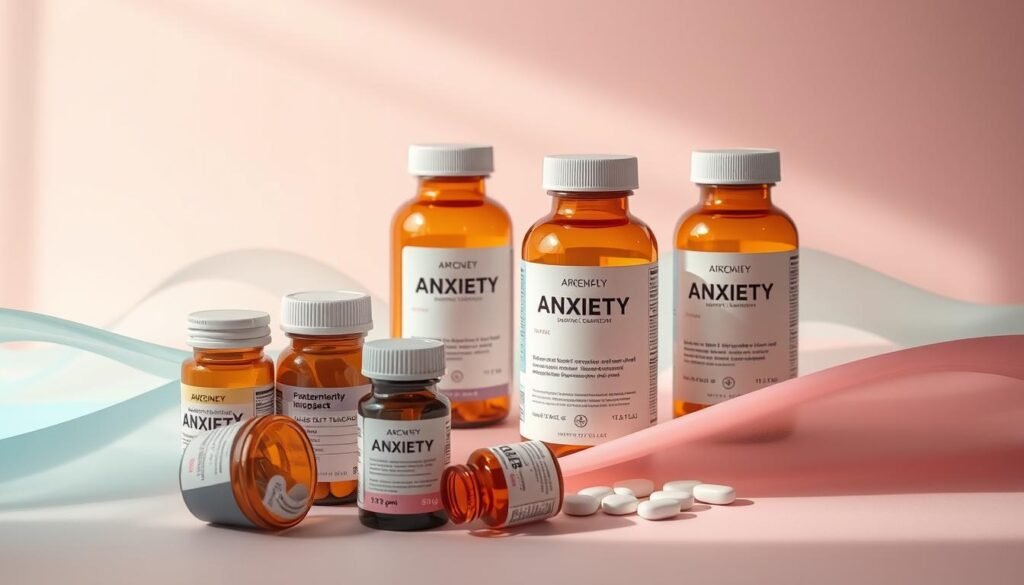Did you know that anxiety disorders are the number one mental health issue in the U.S.? They affect over 19% of the population. That’s roughly 40 million adults grappling with anxiety. Knowing the duration of medication use for anxiety is key for good care. This guide covers what you need to know about the anxiety treatment timeline. It looks at different meds, possible side effects, and why a personalized plan is vital for long-lasting anxiety medication use.
Medication can bring relief but might also have downsides, especially if used for a long time. The information here helps you make smart choices about treating anxiety. Whether you’re thinking about short-term anxiety medication or seeking permanent fixes, talking to a healthcare provider is critical. They can create a plan that fits you perfectly. To understand more about anxiety medications and their impact, check out this detailed guide.
Key Takeaways
- Anxiety disorders impact over 19% of the U.S. population.
- Understanding the timeline for medication can aid in better management of anxiety symptoms.
- Consulting healthcare providers is vital for personalized treatment options.
- Temporary and long-term anxiety medications each have unique considerations.
- Be aware of the side effects and risks associated with anxiety medications.
Understanding Anxiety Disorders
Anxiety disorders include several types, like Generalized Anxiety Disorder, social anxiety, and panic disorder. These can affect your daily life seriously. Understanding and effective treatment are vital.
In the US, millions are impacted by anxiety. About 3.1% have Generalized Anxiety Disorder. Symptoms of anxiety include a lot of worry, feeling restless, and having trouble focusing. Women are more likely than men to face these challenges.
When it comes to when these disorders start, it varies. For phobias and separation anxiety, it’s often at seven years old. Social anxiety usually starts at about thirteen. Panic disorder often begins around twenty-four. Knowing this helps highlight the anxiety facts in the US. It also shows why it’s important to get help early.
Even with research progress, there are no biomarkers for these disorders yet. Treatment usually includes talk therapy and medicine, aiming to lessen symptoms of anxiety and better life quality. Spotting these issues early and treating them right is key to handling them.
| Anxiety Disorder | 12-Month Prevalence |
|---|---|
| Specific Phobia | 10.3% |
| Panic Disorder | 6.0% |
| Social Anxiety Disorder | 2.7% |
| Generalized Anxiety Disorder | 2.2% |
Types of Anxiety Medications
Anxiety can be treated with different medications. The most common ones include SSRIs, SNRIs, benzodiazepines, and tricyclic antidepressants. Each type works differently and has its own benefits.
Escitalopram (Lexapro) and sertraline (Zoloft) are types of SSRIs. They are often the first choice for treating anxiety. These drugs help balance brain chemicals and usually start working in about 4 to 6 weeks. Doctors like them because they work well and have fewer side effects.
SNRIs are similar to SSRIs but also affect norepinephrine. They provide another option for treating anxiety. Together, SNRIs and SSRIs are the backbone of modern anxiety treatment.
Alprazolam (Xanax) and lorazepam (Ativan) are benzodiazepines. They work fast to ease anxiety symptoms. They’re mainly used for short periods, like during panic attacks. It’s important to use them carefully to avoid addiction.
Clomipramine (Anafranil) and imipramine (Tofranil) are tricyclic antidepressants. They also help with anxiety but can have more side effects than SSRIs.
Buspirone is another choice for anxiety. It works differently from SSRIs and benzodiazepines and takes a few weeks to fully work. It’s good for long-term anxiety management but not for quick relief.
Picking the right anxiety medication is crucial. You need to work with a healthcare provider to find what’s best for you. Each type of medication has its own pros and cons. For more information on these medicines, you can check out this resource.
| Medication Class | Examples | Duration of Effect | Common Side Effects | Dependency Risk |
|---|---|---|---|---|
| SSRIs | Escitalopram, Sertraline | 4-6 weeks for effects | Nausea, insomnia, sexual problems | Low |
| SNRIs | Duloxetine, Venlafaxine | 4-6 weeks for effects | Dizziness, dry mouth, headache | Low |
| Benzodiazepines | Alprazolam, Lorazepam | Immediate | Drowsiness, confusion, dizziness | High |
| Tricyclic Antidepressants | Clomipramine, Imipramine | 4-6 weeks for effects | Weight gain, constipation, dry mouth | Moderate |
| Buspirone | Buspirone | Several weeks for full effect | Dizziness, nausea, headaches | Low |
The Role of Medication in Anxiety Treatment
Medications are vital in treating severe anxiety that affects daily life. They quickly ease symptoms, helping individuals do everyday tasks. But, while they diminish distressing symptoms, medications do not cure anxiety. Thus, combining medication with therapy often leads to better results.
SSRIs and SNRIs, like sertraline and escitalopram, need four to six weeks to work. They help those with Generalized Anxiety Disorder (GAD), which impacts about 5-6% of the population. Meanwhile, benzodiazepines offer fast relief for short-term use. However, they have an addiction risk if used too long. So, they are mainly for brief treatment periods.
The mix of medication and therapy is key. Cognitive Behavioral Therapy (CBT) excels at treating GAD. It teaches long-term coping skills that pills alone can’t provide. Although meds offer rapid relief, adding therapy is necessary for lasting improvement.
Knowing how medication and therapy work together helps people understand their options. This knowledge empowers them to make informed mental health care choices.
How Long is the Duration of Medication Use for Anxiety
The length of time people use medication for anxiety differs. To find the best anxiety treatment timeline, patients and doctors must work closely. They often start with drugs and therapy together. Changes are made based on how well the treatment works.
Initial Treatment Phases
At first, drugs called SSRIs and SNRIs are usually given for six months after symptoms get better. In these initial weeks, it might take about four to six weeks to see less anxiety. For quick relief, short-term drugs like benzodiazepines are used. They work fast, in 30 to 60 minutes, but only help for a few hours.
Long-Term Use Considerations
Over time, long-term anxiety medication use might be necessary, especially for those with ongoing or severe anxiety disorders. Using benzodiazepines for a long time is generally avoided because of the risk of dependence and addiction. If it’s time to stop taking them, it’s important to lower the dose slowly. Stopping suddenly can cause withdrawal. Always talking to your doctor helps manage the use of any medicine safely.

Common Medications for Anxiety
Anxiety can really change how we live each day. Many people look for medicines that work well for them. There are a lot of options, each with their own pros and cons. Knowing about these medicines helps people choose what’s best for their health.
SSRIs and Their Timeline
SSRIs are commonly picked to treat anxiety. Medicines like sertraline and escitalopram take 2 to 6 weeks to fully work. In the beginning, anxiety might actually get a bit worse. More than 80% of people might feel side effects like stomach issues and trouble sleeping.
SNRI Duration for Anxiety Treatment
SNRIs, like duloxetine, also take a few weeks to show their effect. They work in a similar timeframe to SSRIs. People might feel headaches or nausea. A concern with SNRIs is they could raise your blood pressure, especially in higher doses.
Benzodiazepine Use and Limitations
Diazepam and other benzodiazepines work fast to calm anxiety. They’re good for short-term use, but not longer than 2 to 4 weeks. The dose is usually between 1 to 6 mg daily. It’s important to watch for any signs of dependency with these drugs.
Tapering Anxiety Medications
Tapering anxiety medications needs careful planning to avoid withdrawal symptoms. Around 51% of patients face challenges when stopping their meds. Symptoms like increased anxiety and restlessness make it harder.
A healthcare provider is key in this journey. They create a tapering plan that meets each person’s needs. This process can take weeks or months to ensure a smooth change. A well-planned taper is crucial for reducing withdrawal symptoms and preventing a relapse.
There are two main tapering methods: *hyperbolic tapering* and linear tapering. Hyperbolic tapering starts with big dose cuts, then reduces them slowly. It tends to cause fewer withdrawal symptoms. Studies show that hyperbolic tapering allows doctors to adjust the plan if symptoms get worse.
Telling the difference between withdrawal symptoms and the return of anxiety can be tough. A study found that stopping meds increases the risk of the anxiety coming back. Slow tapering is a key method for safely stopping the medication. For example, a patient was able to stop taking citalopram in nine weeks with a hyperbolic method, despite some initial withdrawal symptoms.
Before tapering, patients should talk to their healthcare providers about the best plan. There are tricks like opening capsules or dissolving tablets in water for easier dosing. Knowing these methods helps people manage their medication tapering better.

Potential Side Effects and Risks
All medications for anxiety have possible anxiety medication side effects. It’s key that patients know the risks of anxiety treatment. This helps them make wise choices. Side effects like drowsiness, nausea, and agitation are common. They can affect your day-to-day life.
Drugs called SSRIs and SNRIs can change your weight and sexual function over time. This worries people about their health. Benzodiazepines, such as Xanax and Valium, can impair thinking and lead to addiction. Knowing these risks is critical before starting these meds.
Here are some medication side effects tied to anxiety treatments:
- Benzodiazepines might cause withdrawal symptoms like confusion and seizures if stopped suddenly.
- Barbiturates are stronger but can quickly lead to addiction.
- SSRIs can lead to side effects like dizziness, sexual issues, and stomach problems.
People taking anxiolytics should avoid mixing them with certain meds, alcohol, and opiates. This mix can be dangerous. Overdosing, particularly with barbiturates, can be deadly. Understanding these risks of anxiety treatment is crucial. It stresses ongoing check-ins with healthcare providers to watch side effects.
Being on anxiolytics for a long time may cause tolerance and withdrawal problems if stopped all of a sudden. Recognizing these issues helps patients manage their treatment better. They can think about both meds and therapy options.
| Treatment Type | Common Side Effects | Dependency Risks |
|---|---|---|
| Benzodiazepines | Memory loss, coordination issues, increased anxiety upon withdrawal | High |
| SSRIs and SNRIs | Sexual dysfunction, headaches, weight changes | Low |
| Barbiturates | Potential overdose, strong sedation, habit-forming | Very High |
| Beta-blockers | Fatigue, cold hands, insomnia | Low |
Medication Dependence in Anxiety
Anxiety medication dependence is a serious issue. Many people rely on benzodiazepines like Valium, Xanax, and Klonopin for fast relief. These drugs work quickly but can be addictive. Users might need higher doses over time, which leads to bigger problems.
There’s a clear trend linking anxiety meds to substance abuse, especially in veterans and domestic abuse survivors with PTSD. The effects of long-term use of these meds can be both physical and psychological. It often leads to a cycle of dependence on these drugs.
Experts warn about the risks of dependency. Warning signs include getting meds from non-medical places and lying about prescriptions. People stuck in this situation face tough withdrawal symptoms. This makes switching to safer options like SSRIs and SNRIs hard. These alternatives are better for long-term management without addiction risks.
Cognitive-behavioral therapy (CBT), yoga, and meditation can help too. They are good ways to deal with anxiety in a healthy manner. Addiction treatment centers help patients find these strategies. They focus on overcoming anxiety while avoiding drug dependence.

To tackle anxiety medication dependence, a well-rounded plan is crucial. It must focus on the patient’s health and avoid dependency risks. The goal is long-lasting relief, achieved with careful management and better treatment options.
Alternatives to Medication
Many people look for ways other than medication to handle anxiety. They find that therapy offers strong support. It helps them build skills to cope in ways that suit them. Cognitive-Behavioral Therapy (CBT) is especially good at changing negative thoughts that cause anxiety. Dialectical Behavior Therapy (DBT) helps too, teaching mindfulness to control emotions and anxiety.
Therapy Options
There are many therapy choices besides just talking to someone. Eye Movement Desensitization and Reprocessing (EMDR) helps those with severe anxiety from past trauma. Therapy teaches understanding and skills to deal with anxious moments. Working with a therapist means getting help that fits you, which can really help reduce anxiety.
Self-Help and Lifestyle Changes
Self-care is key in fighting anxiety. Doing things like running or swimming lowers stress and anxiety, according to the Anxiety and Depression Association of America. Adding mindfulness and meditation can calm your mind. These activities also help you sleep better, giving your brain a break from anxiety. Eating foods with omega-3s and cutting down on caffeine are good for your brain health. By living a healthy life, you can support your therapy and control your anxiety better.
Conclusion
An effective anxiety treatment plan needs a full understanding of medication timelines, side effects, and other ways to manage anxiety. With a 32% lifetime chance of anxiety disorders in the U.S., it’s vital to make well-informed treatment choices. Working with a healthcare provider helps patients understand the use of SSRIs, SNRIs, and other options like buspirone. This ensures they get the right support for their needs.
About 60–85% of anxious patients find success with current treatments. Yet, full recovery is hard for many, especially those with other health issues. The success of treatments varies, and finding the right one can take time. This shows why working closely with doctors is important.
This conclusion points out that medication, therapy, and lifestyle changes together can improve long-term health. As new anxiety treatments emerge, staying updated and exploring personal treatment options is key. This approach helps people handle their anxiety more effectively.